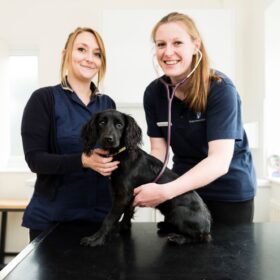Vaccinating your pet is a key step in protecting your pet against life threatening diseases, including parvovirus, canine adenovirus and canine distemper virus. These diseases are still diagnosed in the UK, and so pose a constant danger to any unvaccinated animal.
Dog vaccinations:
Puppy Vaccination
Puppies require a course of two vaccines that cover Distemper(D), Hepatitis(H), Parvovirus(P) and Leptospirosis (L2/4)
- 1st vaccine – from 6 weeks of age
- 2nd vaccine- from 10 weeks of age, 2-4 weeks after the first vaccine*
*For L4, this needs to be given exactly 4 weeks after the first vaccine
Booster Vaccination
Dogs will need a yearly booster and, whilst there is a grace period of three months, it’s a good idea to pop a reminder in your calendar when the boosters are due to avoid having to restart the course!
The Leptospirosis (L2/4) vaccine will be needed yearly, however the DHP vaccine is only needed every 3 years.

DHP
Leptospirosis
Kennel Cough Vaccination
This is a single vaccine that needs to be repeated yearly to maintain protection. It is not part of the core vaccinations but is recommended for any dog who frequently comes into close proximity with other dogs such as in training classes, day care, kennels and on walks in popular areas.
Cat vaccinations:
Kitten Vaccinations
Kittens require a course of two vaccines that cover Feline Calicivirus (FCV), Feline Herpesvirus (Rhinotracheitis) FHV, Feline Parvovirus (Panleukopenia or Infectious Enteritis) FPV (Tricat) and Feline Leukaemia Vaccination (FeLV) – more info on these below!
- 1st vaccination – from 9 weeks of age
- 2nd vaccination – at least 12 weeks of age, 3-4 weeks after the first vaccination
Booster vaccination
Cats will need a yearly booster and, whilst there is a grace period of three months, it’s a good idea to pop a reminder in your calendar when the boosters are due to avoid having to restart the course!

Tricat
FeLV
Vaccination FAQs
How do they work?
As with all vaccines, a small dose of either dead or live organisms is injected into your pet. Your pet’s immune system will then produce antibodies against these diseases. If your pet then comes into contact with any of the diseases, his or her immune system will recognise it and begin producing the antibodies needed to fight the disease.
Why do I have to wait until my pet is a specific age to vaccinate?
A mother passes on antibodies (Maternally Derived Antibodies, MDA) to her puppies and kittens through her milk. This immunity, though short term, can prevent the puppy or kitten creating its own antibodies when vaccinated. The levels of MDA normally drop between 6-8 weeks of age so starting a puppy/kittens vaccination course at a specific age maximises the chance of providing protection.
Vets will occasionally move away from the normal time limits if, for example, there is a question mark over the health or nutritional state of the animal.
Why does my Chihuahua have the same vaccine dose as a Great Dane?
Vaccinations are given to stimulate the immune system to make antibodies therefore the levels will be the same regardless of body mass.
Why does my pet need an annual booster?
Recent studies have shown that high levels of antibodies are produced by the immune system against some diseases for longer than others. This is why in the case of dogs, their ‘booster schedule’ will differ from year to year.
Are vaccinations safe?
Yes. Before manufacturers can sell their vaccines, the vaccines have to go through very strict, rigorous testing. This is regulated by the Veterinary Medicines Directorate (VMD). All data is available to the public once the product has been approved.
It is extremely rare for a pet to show any serious side effects following vaccination. However, as with humans, you may see some mild reactions, such as pets being off their food for a day or two, or being a little quiet, but these are normally short-lived.

